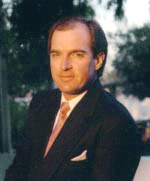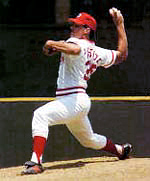|
A Big-League Skeptic Finds Faith At The Cross
Written by Frank Pastore
Excerpt from, POWER OF THE CROSS © 1998 by Tim
LaHaye.
Published by Multnomah Publishers, Inc. Used by permission of Tim
LaHaye Ministries.
Excerpt may not be reproduced without prior written consent.
It was early summer, I was seventeen years old, and life
just couldn't get any better. I was young and healthy with a bright
future before me. I was senior-class president at Damien High School
in La Verne, California. I had earned an academic scholarship to
Stanford University, was dating a popular trophy (i.e., cheerleader), and
the Cincinnati Reds had just offered me the largest bonus in Reds history
to pitch for them if I would just pass up my scholarship and sign on the
dotted line.
The decision was really simple. I truly had
only one guiding question: Which of the two paths will bring me the
greatest happiness? Translated, that meant "What's the quickest
way to become rich and famous - major league baseball or law
school?" At seventeen, that was no contest. I signed with
Cincinnati on June 6, 1975, and a few days later began my professional
career with the Billings Mustangs of the Pioneer League.
Four minor-league seasons later, in Riverfront Stadium on opening day,
1979, before a sellout crowd of fifty-six thousand, I appeared in
"the Show" as the youngest player in the National League.
I was only twenty-one, and I brought with me my beautiful young bride of
seven months, a blazing fastball, and a burning desire for success.
My boyhood idol, Tom Seaver, had started the game but got into trouble
early; I was called on to relieve him and get the team out of the
inning. When manager John MacNamara called for me out of the
bullpen, I floated to the mound with a standing ovation ringing in my
ears. After a few brief words, Mac handed me the ball, and with a
wink from catcher Johnny Bench (J.B.), I proceeded to do what I had done
my whole life. I threw fastballs as hard as I could, hitters swung
and missed them, and I was told how wonderful I was for performing so
well. I loved every second of it. I did well that day and I
enjoyed doing the postgame interviews almost as much as I enjoyed the
standing ovations. After all the minor-league bus trips, and all the
minor-league paychecks, I had finally made it - I had finally made it to
the major leagues!
One Pitch
From Humility After the game,
J.B. called me over to his locker. Back then, rookies were seen and
not heard in the clubhouses, so when a veteran - especially a Hall of Fame
veteran - spoke to you, you jumped. I'll never forget the advice he
gave me on that storybook first day. "Kid," he said
softly, "there's two things you need to know about playing in the
major leagues. First, it's harder to stay here than it is to get
here. And second, never get too cocky or too arrogant, because
you're always only one pitch away from humility."
Great words of wisdom from one who had done it
all and seen it all! He was right, of course, but at the time his
advice went in one ear and out the other. At twenty-one, I already
knew the meaning of life - to be happy - and the best way to be happy was
to be rich and famous, and the quickest way for me to become rich and
famous was to pitch in the major leagues for a long time.
Over the next five seasons I set out for more,
and along the way I accumulated all the right trappings of a successful
young professional. I bought all the right status symbols (a
Porsche, Mercedes, house, condo, etc.); I earned the respect of my peers
(I became the Red's Player Rep); I put a little money away just in case,
started an off-season construction business, had two great kids, remained
absolutely faithful to my wife, and avoided abusing drugs and
alcohol. Basically, I played life by the rules. Most of the
guys on the team considered me a "goody-good" because I didn't
drink, do cocaine, or cheat on my wife. By default I hung out with
the Christians, because they didn't do those things either.
For twenty-seven years I was a practical atheist,
an evolutionist. I rejected Christianity because I had been
convinced it was false. Very simply, if there is no God and no
afterlife, then our existence is utterly meaningless. Since there is
no meaning to life, all that is left is to create meaning in this life as
you go. For me, it was in winning the "survival of the
fittest," and in our culture that translates to "He who dies
with the most toys wins." I thought I could create my own
happiness, my own meaning, if I become rich and famous.
Funny thing was, although I became somewhat rich
and sort of famous, I wasn't any more content than I was on the day I
signed with the Reds. Even living the American dream didn't bring
fulfillment. Playing life by the rules didn't bring it either.
The issue isn't what is outside, the issue is what is inside.
Since the first grade I had been taught to doubt the existence of God: The
universe had just popped into existence out of nothing, evolution was a
"scientific" fact, miracles can't happen, the Bible's been
changed, etc. During my whole life I had accepted the government's
humanistic propaganda that the teachings of Darwin, Marx, Freud, Hume, and
Kant had all combined to make religion obsolete. As these thoughts
raced through my mind, my heart was drawn to the quality of life I had
observed in my Christian teammates. When I found myself wanting to
yield to my emotions and pray, I had to remind myself that "God"
wasn't real. He was merely a crutch for intellectual weaklings, an
excuse for mediocrity and failure, a placebo for psychologically
imbalanced people - although also an effective and soothing pacifier for
whining, injured professional athletes.
Although I may have all the external signs of
success, internally there was something wrong. Something was
missing. There was a hole in my life that more wasn't
filling. I tried to fool myself that the next good game, the next
sports car, the next winning season, or the next contract would do the job
- but they never did. I slowly began to lose faith that
baseball would ever make me happy and fulfilled. I remember looking
around the clubhouse one day and coming to the realization that although
most of these men had become rich and famous, only a few were truly
happy. That was very disturbing. Since I was six years old, I
had wanted to be just like them - but if they weren't happy with all of
the money and all of the success they had, what made me think I was going
to be any different? The only guys on the team that seemed to be
"together" were the guys I regularly made fun of behind their
backs, those religious fanatics who brought the Bible into the locker room
and on road trips, those born-again Jesus freaks who believed in the
Easter Bunny, Santa Claus, and people rising from the dead.
Back then, I would not have considered myself a
religious person - I was a realist. I was a realist because I
believed only in what was real and true - things like science, history,
psychology, chemistry, and physics. I believed that some being call
"God" may have caused the Big Bang, but I knew that evolution
was a fact, that morality was culturally relative, and that environment
and chemicals could account for all human behavior. Those were the
things I had been taught in school. I did not believe that Jesus
Christ was God, that He had been born of a virgin, that He had risen from
the dead, that the Bible was inspired, that there was a literal heaven and
a literal hell, or that there had ever been prophecies or miracles.
Simply put, I just didn't believe Christianity was true. 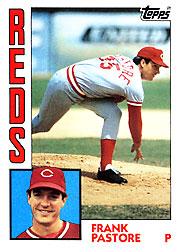
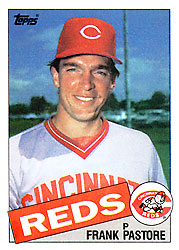
The
Pitch That Brought Humility Then
on June 4, 1984, in Dodger Stadium, all of that changed. J. B.'s
prophetic words were fulfilled. I was cruising to a 3-1 victory with
two outs in the eighth inning, when I made the pitch that eternally
changed by life. Dodger Steve Sax rocked a 2-2 fastball off my right
elbow and my whole world-view shattered in one painful instant.
Immediately, I knew my arm would never be the same again, and my career,
as I had known it, had come to a tragic end.
The crack of the bat still echoed through the
stadium as every eye focused on me as I clutched my elbow and grimaced in
agony. The eerie silence was broken by a collective gasp as the
crowd turned to watch the replay on Diamond Vision. As I glanced up
to take a peek at it myself, everything seemed to be happening in slow
motion - it was like a bad dream - and I just wanted to wake up from the
nightmare. "Why, God? Why!?" I prayed desperately on
my way to the training room, but I had to remind myself no one was
listening.
Deep in my heart, I knew my life would never be
the same. I had always derived my sense of security and self-esteem
from my athletic performance. Baseball had been my god and my source
of identity. For twenty years my identity was in being a
baseball player, not in playing baseball. I had confused what
I did with who I was, like many others. I was no longer
going to be a baseball player. I had lost my identity; I was
a nobody. That frightening reality crashed down upon me in
thunderous waves of terror.
As unlikely as it may seem, it was in the midst
of all this that I was introduced to the concept that God was real.
As I walked into the training room, my small but faithful group of friends
- the Christians - asked me whether I would mind if they prayed for
me. "Of course you can pray!" I said.
"You can do anything you want if you think it'll help." How
cute, I thought, the religious fanatics want to pray for
me. Isn't that just like uneducated people to turn to a mythical god
in a crisis situation?
Not long after that, Tommy Hume, the Red's
Chapel Leader, invited me to his house for a barbecue and, if I wanted to
stay, a Bible study. Tommy had asked me to come to Bible studies
many times over the years, and I always came up with some lame excuse not
to go. However, this time I agreed. I tried to tell myself
that I couldn't stand the fact that these guys were so
"together" while I was falling apart. On the surface, I
acted as though it really bugged me that they were so naive. But
deep down I wanted to know more about the Jesus they prayed to.
I arrived at Tommy's house and said hello to the
regular bunch of guys: Duane Walker, Tom Foley, Danny Bilardello, and was
introduced to a guy named Wendel Deyo, whom I recognized from some of the
chapels I had attended. (They didn't tell me he was the national
director of Athletes in Action and a twenty-year veteran of working with
overpaid, prima-donna, insecure, non-Christian athletes.) After the
hamburger-and-hot-dog thing was over, we got down to business.
Wendel gathered us to start the study. Now, I had never been to a
Bible study. Heck, I didn't even own a Bible! But I knew all
about the Bible - it's unhistorical, it contradicts itself, you can make
it say anything you want to, and it's been changed many times over the
past two thousand years. But most of all, I was convinced it was
simply wrong; there had never been any miracles - we just hadn't figured a
scientific way to explain some things yet. One day we'd know how
something came from nothing, or how all those Egyptians soldiers drowned
in only six inches of water but 3.5 million Jews made it through
unharmed! As soon as the opening prayer ended with "amen,"
I came out shooting.
I launched all of my hurt, anger, and confusion
in a fierce salvo of blasphemous missiles aimed at religion and
Christianity. I fired for half an hour, attacking everything about
Christianity. The guys were blown away - they looked like that guy
in the popular commercial who's reclining in a chair in front of a
speaker, his hair blown back by the incredible volume. They didn't
interrupt once throughout the whole tirade; I didn't give them the chance
to.
When I finally stopped, believing I had
successfully enlightened the guys to the truth about reality, Wendel spoke
up for the first time since the amen. "Wow. I've never
heard anyone articulate their views with such passion and reason as you've
just done. Frank, I simply can't answer most of the questions you've
raised; boy, I don't even understand most of the questions!
The guys had told me you were smart, but they didn't tell me you were this
smart!" With my good arm I was patting myself on the back.
"But, Frank," Wendel continued, waving
to the rest of the guys, "we don't want to believe in myths, stories,
or anything that isn't true or real. We want to believe in what's
true. Right guys?"
"Right!" they all answered in
chorus, almost on cue.
"So, will you help us?" he asked,
placing the bait before me.
"Of course, guys. You're my
friends. I don't want you guys building your lives of lies," I
said, smelling the bait.
"Great. Here's how you can help
us. I just happen to have brought some book," he said reaching
behind the couch to grab some small paperbacks. "These books
present and defend Christianity better than we can. Will you have a
look at them, and as you read, maybe write in the margins where the
authors are wrong and why, so that we can think clearly about all these
things? Then after the next road trip, we can all get together
again, and then maybe we can become happy and fulfilled, just like
you!"
"Sure, I'll be glad to help. Really,
guys, disproving Christianity won't be very hard. I'll start with
Genesis and prove to you why the creation story is an unscientific
myth," I said, swallowing the hook, line and sinker, and pole, and
dock.
Wendel handed me three books. Now mind you,
I had never met an intelligent Christian before - I thought the term was
an oxymoron like jumbo-shrimp - because before whenever I had asked a
Christian a serious question, they would invariably respond, "I don't
know, but Jesus loves you!" That doesn't help a whole lot if
you don't know who Jesus is! The titles of the three books handed to
me were: Mere Christianity by C. S. Lewis; Scientific
Creationism by Henry Morris; and Evidence That Demands a Verdict
by Josh McDowell.
That night, I began reading Mere
Christianity. I read all night. The next day at the ballpark,
I snuck off the bench during the game and hid in the weightroom to
continue reading. I started out with the intent to help my friends
get their thinking straight, and of course found myself even further
confused. Over the next three weeks, I read and reread the
books. I devoured them. I can remember the guys coming over to
me several times to ask how things were going and telling them that I was
still working on disproving the Bible, but that it was just taking a
little longer than I expected.
Then it happened. I was in Pittsburgh reading Evidence That Demands
a Verdict in the clubhouse during the game, when the lights came on.
It was my very first "Oh!" experience - "Oh!" is the
most popular word in heaven among new arrivals. The reality that a
personal God had spoken the universe into existence out of nothing; that
His Son, Jesus Christ, had died on the cross for my sins and the sins of
the world; that He validated His testimony by rising from the dead before
hundreds of witnesses; and that Jesus was the way, the truth, and the
life, and that the only way to heaven was through Him - hit me like the
blazing sun would smite the eyes of someone who had spent a week in a dark
cave.
"Jesus, you're alive!" I whispered.
Simultaneously I had two powerful emotions.
The first was joy - my sins could be forgiven! The second was anger
- I was ticked off that I had been lied to my whole life. It was
naturalistic evolution, secular humanism, and the other atheistic
ideologies that were myths, not Christianity! Not once was I ever
told there were good reasons to believe in God or Christianity. I
was simply told that evolution was a fact and to ask questions about it
was to be heretical and unscientific. Not once through elementary
school, junior high, or high school did I hear that there were problems -
huge, gaping problems - with evolution. I realized I had been
deceived my whole academic life, and I was furious. I could have
died and gone to hell because people wanted to repress intellectual
freedom and force their agenda on me! Why couldn't they just have
presented the arguments both for and against Christianity and let me
decide for myself, based upon the evidence? The issue should have
been Truth, not Ideology.
I prayed, "Lord, I know that I am a sinner
and that Jesus came to save sinners, and that He came to save me.
Forgive me of my sins. I'm asking You to come into my life and
change me. Make me the person You want me to be. I now promise
to follow You, to the best of my ability, every day for the rest of my
life. Thank You, Jesus, for being my Savior, I now want to make You
my Lord. Amen."
It was only about two months after making that
pitch in Dodger Stadium that I gave my heart, my mind, and my life to
Jesus Christ. Nine years earlier I had gone into pro ball to get
rich and famous. Finally, I was rich - rich with the
knowledge that my sins were forgiven and that I would spend eternity with
Jesus Christ in glorious fellowship. And I was famous - I may
not have been in Cooperstown, but I was in the Lamb's Book of Life.
Despite the injury and all the uncertainty of my career, I knew the void
in my heart I had been trying to fill my whole life had finally been
filled. My wife, Gina, came to Christ a short time later, and when
our daughter was born in October of 1984, we named her Christina to
commemorate our commitment to Him and to honor her.
I retired from baseball in June 1987, and because I had
signed a professional contract out of high school, I became a
thirty-year-old college freshman at National University in Irvine,
California, that fall. In two years I received a degree in business
and my wife and I decided to spend some time in ministry before going on
to law school. We raised support and joined the national office
staff of Athletes in Action, the sports ministry of Campus Crusade for
Christ. While of staff, I had the chance to speak often and found I
enjoyed answering people's questions about Christianity more than just
about anything else. Walter Martin, Josh McDowell, and Henry Morris
were my heroes, and I read nearly everything I could get my hands on that
those guys wrote. After almost two years on staff, we decided that I
could best serve the evangelistic effort of the church as an apologist, so
we changed our plans from law school to graduate school - the only
question was, Where?
We researched the best programs at the best
schools and concluded that the top apologetics program in the country was
being run by J. P. Moreland at Talbot School of Theology, Biola
University, near Los Angeles. Although I had played for seven season
in Cincinnati, we never lived there year 'round; Los Angeles was our
home. So we started the program in June 1991, and I graduated with a
Masters in Philosophy of Religion and Ethics in December 1994. I
currently direct the Talbot Institute for Biblical Studies, a church-based
training ministry to help churches establish their own lay institutes for
Christian education.
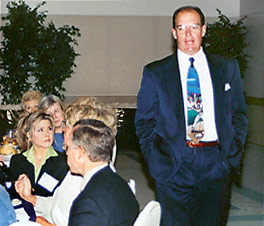
Frank
Pastore, luncheon guest speaker at Loma Linda University,
shares his personal experience with spiritual
growth.
Photo courtesy of © Loma
Linda University, School of Dentistry. |
